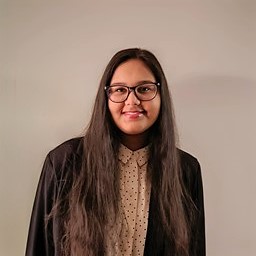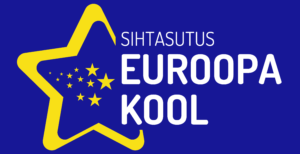Interview with Subhrajyoti “Subhra” Dash (S7 – TES Graduating Class of 2022)
Subhra tells us everything about her experience at TES as a Secondary 7 student, and the exciting plans she has for next year after she graduates from TES. Subhra was one of the first students of our school when she joined TES in Primary 4 back in 2013 when the school was established.

Good morning, Subhra. As an S7 TES Senior, tell us a bit about yourself.
My name is Subhrajyoti Dash, but I am known around the school as Subhra. I have been studying in TES since P4 (2013) so it’s been a long time here. I am originally from India but I have been living in Estonia for a total of more than 10 years. I speak multiple languages – fluent in English, Hindi and Oriya and currently learning French and Spanish at school.
Why have you chosen to attend TES?
Firstly, TES gives its students an incredible advantage with the languages. I have been learning French and Spanish for about 8 years now and in multiple scenarios, I have been more than grateful that I know them. Having an extra language at hand is always beneficial and thanks to TES, I have two of them. Also, as I have some lessons such as history and geography in French, it helps to widen and improve my language skills. It’s amazing to think that I would be graduating TES with a level of at least B2 in French and B1 in Spanish!
In addition to the language, I admire the TES community and their friendliness. Teachers are always welcoming whenever there are questions and they ensure to help us as much as possible towards our goals.
What are your plans after graduating from TES?
I am very happy to announce that I have just been admitted to ESCP (École Supérieure de Commerce de Paris) for their 3-year Bachelor of Science (BSc.) Degree. My first year is in London, the second year in Paris and my final year will be in Berlin. I am very thrilled and excited to be admitted as it was my first choice and suits perfectly with what I want to do after my studies – combining my business and economics skills with managing/building a sustainable venture for a higher cause.
Congratulations! ESCP is one of the top universities in France and Europe and part of the highly selective “Grandes Écoles” system in France. What did it take to get accepted into such a competitive program?
The application hurdles are high and the process is very selective. Firstly, there is the formal (written) application process which includes standardized tests (i.e. languages), recommendations, grade transcripts, CV and a personal statement. Then, if successful, the candidate is invited to the interviewing process. Due to COVID-19, the interviewing process was fully online for me. It takes almost a full day and usually consists of writing prompt essays, individual and group interviews as well as a Q&A session. Interviewers are usually Professors, Administration as well as Alumni students. It is a bit long but overall it was an incredible experience which I enjoyed a lot. It was also an interesting learning experience of being on the spot and answering questions or being put in a scenario and solving a problem.
Once I got accepted, I had to figure out how to fund my education. Top universities around the world are not for free (unfortunately), however, there are (fortunately) ways to reduce the financial burden. As an Indian native, the tuition costs for “non-EU” citizens who would like to pursue studies in the EU are significantly higher compared to EU citizens (about 40% higher p.a.). In my case, ESCP granted me a “merit-based” scholarship for the first year. On top of that, I applied for a “need-based” (financial) scholarship. However, scholarships are reviewed annually and are prolonged based on need and academic performance, meaning I have to study hard and perform well in order to get another scholarship during my second year.
How did TES prepare you for university life in terms of subjects studied and the application process in general?
Back in S6, I understood for the first time that I have basically two choices: to “go with the flow” and wait for whatever comes my way… or, alternatively, actively pursue my dreams and passion – now.
However, that is easier said than done. When our external “coach” Stefan gave us an overview of the lengthy application process, the opportunities and also the challenges, my first thought was that I cannot do it. It seemed impossible at that moment. Why should a top university even consider me? What is so unique about me? Being rather introverted by nature, I had to step out of my comfort zone and seize the opportunity. It was necessary. Today, 12 months later, I have learned so much about myself. I have grown personally, have more self-confidence and – most importantly – understood that “achieving” is always a combination of skill and will. If I can do it, you can do it. But you need people, mentors, coaches etc., that believe in you and are willing to help you discover and achieve your maximum potential. I am very grateful, indeed, for all the support I have received from many people including my family, teachers and Stefan.
In terms of subjects, one of the main elements is the languages. During my second year in Paris, I will be having some subjects in French and by already having some lessons (History, Geography and Economics) in that language at school, I feel more comfortable about using it at university. Even living in France would require me to use my language skills outside of the university, meaning practice and confidence is necessary – which I got from TES. Additionally thanks to multiple presentations that we have to do and class discussions that take place, there is space for tremendous self-development regarding skills such as presentation and teamwork.
In hindsight, what would you have done differently two years ago at TES compared to what you know today?
On a personal level, I would have liked to believe more in myself. Self-confidence is very important and not having it made me quite hesitant with my university choices, doubting if I would even get accepted in a prestigious school such as ESCP. After developing that skill throughout the years, I essentially realized its importance during the admissions process, especially during the interview where the candidate needs to be confident in themselves and their answers.
How important were subject choices for you in S6, S7, what were your favourite subjects and why?
Subject choices were extremely important. In my case, I had already thought of either studying economics or business further on in university so I knew I should keep economics. An important element for me was also languages which is why I chose to continue studying Spanish (L3). I also continued with chemistry as it was a subject I was interested in. Therefore, my subject choices were based on what I like and what I am planning to study in the future – this helped me to keep being motivated and continue working hard in the subjects I have. However, an important thing to note is the wide range of subjects at TES where even though we have to make choices during the last few years of secondary school, we still continue to study subjects such as history and philosophy which are compulsory and allow us to have multiple opportunities open in the future.
My favourite subjects are Spanish and economics. Spanish because as I mentioned before, languages are important to me and it is incredibly fascinating to dive into a language and also explore the country’s culture. For economics, it is a subject that has always been intriguing and makes me curious to know more.
For our current secondary students, what is your advice?
Believe in yourself – you’re capable of more than you think. Someone had once told me that if you believe in yourself then the world will believe you and that is very true. So, I would advise you to do things you want to do, sometimes push your boundaries and step out of your comfort zone (you might be stopping yourself by those assumed boundaries), get involved in different activities and explore. School is truly the perfect place to experience and get involved in multiple things and as much as grades are important, it is also crucial to develop other skills and show elements outside of academics by doing things such as an internship, learning an instrument or being part of the student council.
What did you like most about TES? What did you not like so much about TES?
An incredible skill that I developed thanks to TES was adaptation. Being in a class with people of multiple cultures and nationalities truly helped me to widen my horizon and understand different perspectives. Moreover, there is adaptability in terms of working with different groups. At times, we are even paired with other classes to organize an event and this helps to improve an essential skill that is absolutely necessary nowadays. This is what I love the most about TES.
Personally, I wish there were more options for extracurricular activities. I see the list slowly growing each year (which is great) but I would love it if there were more options and in different themes/areas for the upper secondary, as most of the activities are aimed for the lower classes.
If you come back to TES in ten years, what would you like to see?
I would love to see more interaction happening with other European schools. Either offline or online, I believe it would be very interesting as a student to interact (and possibly do projects or tasks together) with people in other countries. It would be a great way of networking.



